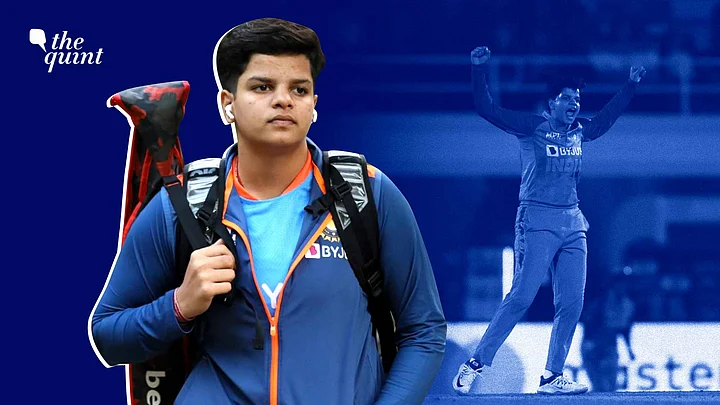Most of us have idols. A person, a fictional character, or even a phenomenon, that instilled in us the courage to not wave the white flag before defeat, and the belief to overcome the sternest of obstacles.
Most of us would utilise this courage and belief whilst we fight out mundane, minuscule battles, but ultimately, the realm of its influence will be a constrained one.
And this is how Shafali Verma, the young batting prodigy of the Indian women’s cricket team, is not like the most of us. For she is, encompassing the enigma that surrounds the word, unique.
Shafali was only nine years of age when his father took her to a Ranji Trophy match at the nearby Chaudhary Bansi Lal Cricket Stadium. The game did not have the usual middle-of-the-road feel to it, as the nation’s cricket ‘god,’ Sachin Tendulkar had stepped foot in Rohtak to represent Mumbai in the competition for the last time.
In every essence, it was a mini farewell before the grandiosity we witnessed at the Wankhede Stadium only two weeks later. But in a weird concurrency, the master blaster’s exit sparked a special exordium, leading to the emergence of Shafali.
A decade since witnessing her idol live in action, Shafali emulated Tendulkar's biggest achievement, at the tender age of only 19. She, alongside a spirited bunch on youngsters, helped India become the inaugural champions of the ICC Women's T20 World Cup 2023.
(An infographic will load below).
From Playing as a Boy, To Playing With Boys
While Shafali had casually swung the bat at a tennis ball previously, watching Tendulkar bat and hearing the crowd chant his name in unison inspired her to pursue the sport as her career. Soon, she would be enrolled in an academy, and while she still is only 18, her journey is spectacular enough to use the clichéd ‘rest is history’ phase.
There were a few hurdles, with the first arriving even before the start of her journey. In her city, there was no place for young girls to hone their skills in the sport. With no alternative option available, Shafali had to enrol herself as a boy, with the constant fear of the camouflage letting her down.
But tables would turn in a year. She would prove her talent and play with the much older kids, and this time around, the boys feared her swashbuckling batting. There was no need to camouflage anymore, and no one could dare let Shafali down.
Consistent performances in the domestic circuit helped her earn a national team call-up at only 15 years of age, becoming the youngest to play a women’s T20I match for India. The debut might not have gone according to plans, marking the ceremony with an unceremonious duck, but it would take her only five matches to record her maiden international half-century.
Yet another record was created, as Shafali became the youngest cricketer to score a fifty for India in an international match. Be it a mere coincidence, or a product of unwavering moral fibre, she broke the record which was once held by her idol, Tendulkar.
First Heartbreak, and the Journey Since
But like its plethora of advantages, there are cons aplenty of premature success, with the most lethal being the most obvious – premature heartbreaks. Only at 16, Shafali would face her first major cricketing low, at the final of the ICC Women’s T20 World Cup 2020.
She would be India’s star throughout the campaign, scoring runs for making and making headlines on the go. Until, the dream collapsed in the final. Everything that could possibly have gone wrong, went wrong for the prodigy, as she first dropped a catch of Alyssa Healy, who later when on to play a match-winning knock, and then could only score two runs with the bat.
Shafali looked inconsolable after the match, and the player who inspired many youngsters over the last year was now in dire need of support, which she received from her teammates.
“Shafali and I were standing almost together when we were receiving our medals. She was in tears. I told her she had to be really proud of the kind of campaign she’d had. When I played my first World Cup at the age of 16, I couldn’t hit the ball 20 per cent of what she can hit,” said Smriti Mandhana.
“For a 16-year-old kid, it's difficult to keep thinking positively and stay in the game. She's only 16, she's playing her first World Cup. She did really, really well and performed for us,” skipper Harmanpreet Kaur consoled.
The combined efforts paid dividends, as the Haryana-born player went back to breaking records sooner than many would have expected. Performances in blue also helped in attracting interest from abroad, as Shafali featured in England’s The Hundred Women’s and Australia’s Women’s Big Bash League.
Two years after her dream of becoming a world champion collapsed, the batter realised the dream, albeit in a different capacity. This time around, she was not the happy-go-lucky, effervescent kid on the block, but the inspirational leader that the nation demanded.
History was made under her captaincy, as India won the ICC Women's U19 T20 World Cup 2023 by beating England – subsequently becoming the first women's team from the nation to win an ICC trophy.
(At The Quint, we question everything. Play an active role in shaping our journalism by becoming a member today.)
